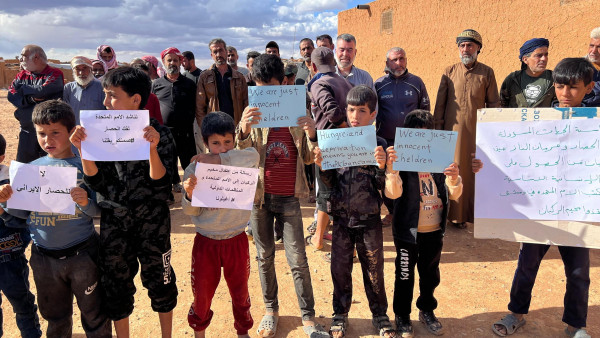Children in al-Rukban, an IDP camp in the no-man’s-land between Syria and Jordan, appeal to the international community to end the siege on the camp. (Provided by a camp resident)
Al-Rukban, a camp of about 10,000 displaced Syrians on the Syrian-Jordanian border, is on the brink of starvation after a month of no food or medicine shipments, residents told The New Arab on Thursday.
The camp has been under siege since 2018, as both the Syrian and Jordanian authorities refuse to allow aid to enter the area.
Residents of the camp rely on a few smugglers to transport food and other basic goods into the camp, creating a limited and costly supply for the impoverished IDPs.
In the last month, however, the Syrian regime has further cracked down on smugglers, completely stopping the trickle of supplies into the camp.
“The road has been cut off for 28 days. No food or medical goods have entered the camp, and the shelves are completely empty. The situation is very bad,” Hisham, a resident of al-Rukban speaking under a pseudonym, told TNA.
He said that residents were now subsisting on milk from livestock and the small amount of bread that remained in the camp.
The humanitarian situation in the camp was previously delicate, with little to no provision of medical care in the camp. According to the last available UN statistics in 2020, nearly 100 per cent of children under 5 in the camp were malnourished.
There have been reported cases of infants dying in the camp from easily treatable diseases due to a lack of medical capacity in the camp.
US forces maintain a military base in the area alongside a small faction of Syrian opposition forces it equips and trains as part of the International Coalition to Defeat and Degrade Daesh.
Human rights groups and residents of al-Rukban have asked that the US provide aid, arguing that it has obligations as the occupying power of the area. The US has repeatedly refused, saying it is the Syrian regime’s responsibility to provide for its residents.
At its peak in 2016, al-Rukban had some 75,000 residents who fled the regime’s crackdown during Syria’s 2011 uprising. The camp’s population has gradually shrunk as humanitarian conditions severely degraded.
Residents believe the most recent crackdown on supplies is an attempt by the Syrian regime to pressure residents to leave, a long-held demand.
“The regime is currently closing all of the smuggling routes in order to constrict us even more. People cannot bear more, the children are hungry, and all they have is dry bread,” Hisham said.
The choice to return is a last resort. Residents have watched as relatives and friends who left the camps have disappeared, some never heard from again, others turning up dead.
The DC-based rights group, Syrian Emergency Task Force (SETF), has documented cases of residents of al-Rukban who returned to regime-controlled areas being tortured to death by Syrian security forces.
Residents have asked the UN to provide safe passage to northwest Syria, the last opposition stronghold of the country under the control of Hayat Tahrir al-Sham, a former affiliate of al-Qaeda.
“I would die before I think of returning to regime areas. It’s better to die with dignity than for the regime to kill me in its prisons, where I will die a thousand deaths before they finish with me,” Hisham said.


